Is It Bad to Hold Newborn Puppies Too Much? [Myths]
Bringing a new litter of puppies into the world is always an exciting experience, but it’s natural for proud pet parents to wonder, “Is it bad to hold newborn puppies too much?”
Proper care and handling of these furry little bundles of joy is crucial for their health and well-being, and understanding the right level of physical interaction can make all the difference.
It’s not bad to touch newborn puppies, but it’s essential to keep contact to a minimum and be mindful of the mother’s reaction.
Newborn puppies are fragile, and handling them should only occur when necessary, such as checking for any health issues. A calm and watchful eye is often the best approach during these first crucial weeks of the puppies’ lives.

As the puppies grow and reach around three weeks of age, handling and socializing them can increase. This helps them develop essential social and emotional skills that will make them well-adjusted members of their future homes. So, with all this in mind, resist the urge to smother your adorable newborn puppies in cuddles the first weeks and instead monitor your maternal instincts for the benefit of their growth and development.
Is It Bad to Hold Newborn Puppies Too Much?
When it comes to handling newborn puppies, it’s important to strike a balance between care and caution. While it’s not inherently bad to touch or hold newborn pups, minimizing contact and being gentle is crucial for their well-being.

In the first few weeks of a puppy’s life, they are particularly vulnerable. Newborn puppies rely on their mother’s warmth, comfort, and nourishment. Furthermore, their immune systems are just beginning to develop, making them susceptible to various infections and illnesses.
During the first three weeks of life, it’s important to limit handling, carrying, or playing with newborn puppies until their eyes open. This reduces the risk of accidentally harming them or exposing them to infections. Additionally, be mindful of the mother’s reaction while handling her puppies.
If she appears aggressive, defensive, or growls, it’s best to give her some space and avoid touching the puppies.
Here are some simple guidelines on how to handle newborn puppies with care:
- Always wash your hands before and after handling puppies to prevent the spread of germs
- Be very gentle while picking up a puppy, supporting their head and body properly
- Limit the amount of time you hold or carry the puppies around
- Avoid handling the puppies if the mother is stressed or unc…
Newborn Puppy Development and Handling
Bonding with Mother Dog
Newborn puppies rely on their mother for warmth, comfort, and protection. It’s essential for them to bond with the mother dog during the first weeks of life. This bonding establishes a sense of security and trust, helping the puppies grow into well-adjusted and confident dogs.
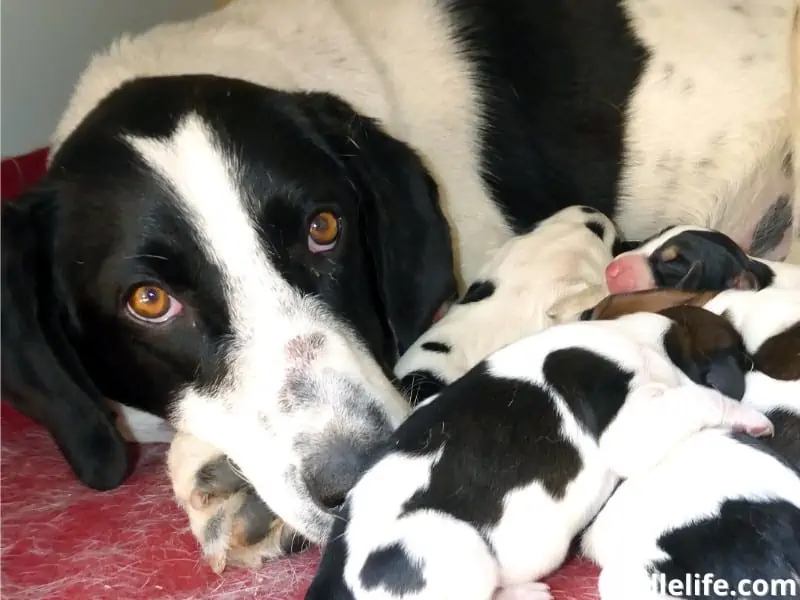
Remember to respect the mother dog’s space and temperament, allowing her to care for her puppies without unnecessary interruptions. Be a quiet observer, only intervening if you notice something wrong.
Feeding and Nursing
During the early stages of puppyhood, nursing is vital for their development and growth. Newborn puppies need to feed from their mother regularly for proper nutrition. To avoid disturbing this natural process, do not handle puppies while they are nursing.
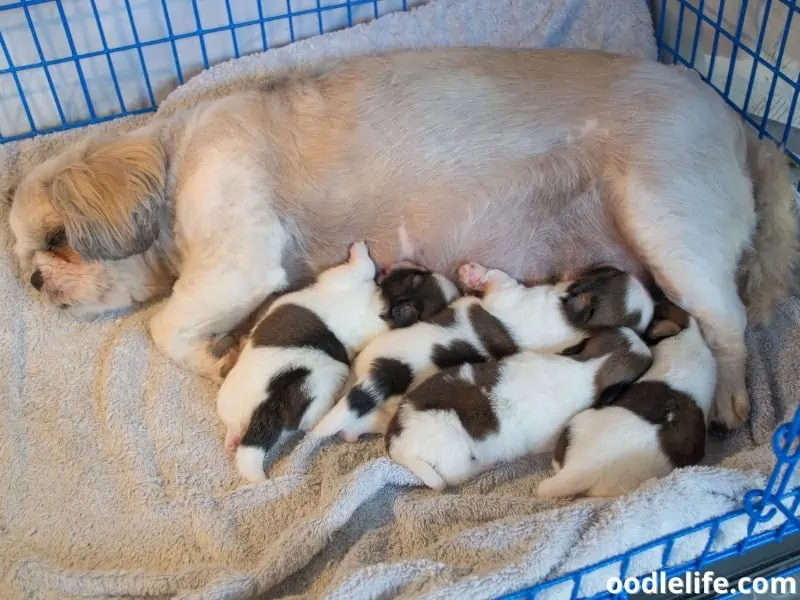
If you must pick up a puppy, make sure to limit their time away from the mother and their littermates to just a couple of minutes.
Exploration and Socialization
As puppies grow and develop, their senses begin to awaken. By 2-4 weeks of age, they start opening their eyes, hearing, and smelling better. This is an exciting time when puppies begin to explore the world around them.
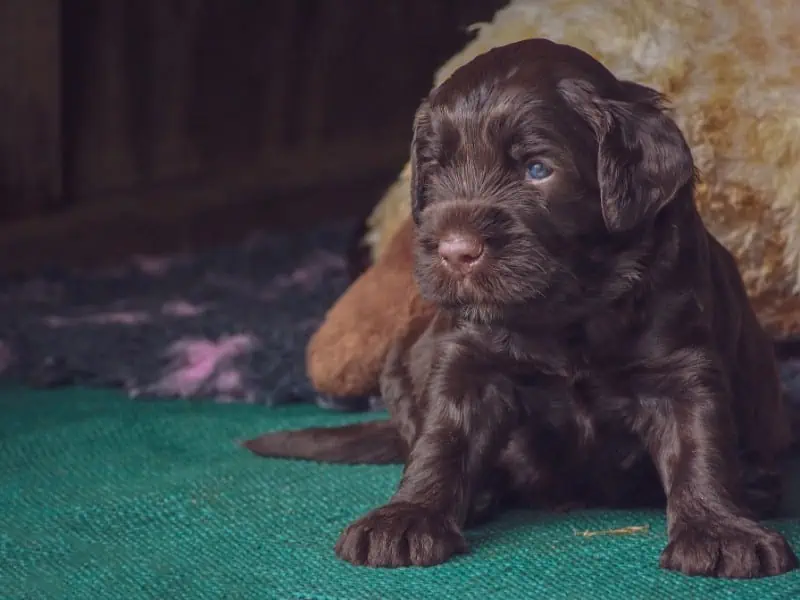
At around four weeks, puppies can start socializing with humans and other puppies. From this point on, you can handle them more frequently and for longer periods. For instance, a breeder could hold a 2-week-old puppy for about a minute or two daily, gradually increasing this duration to at least 5 minutes per day by four weeks of age.
Allow puppies to interact and play with their littermates, helping them learn essential canine behaviors and social cues. Keep an eye on their interactions, ensuring they are safe and positive experiences.
In conclusion, handling newborn puppies should be done with care and caution, while also allowing them to bond with their mother and engage in natural behaviors. Through a gentle approach, you’ll foster their healthy growth and development.
Influence of Handling on Mother Dog’s Behavior
When it comes to handling newborn puppies, their mother’s behavior is an essential factor to consider. A mother dog could become anxious or stressed if she senses excessive interference in her duties.
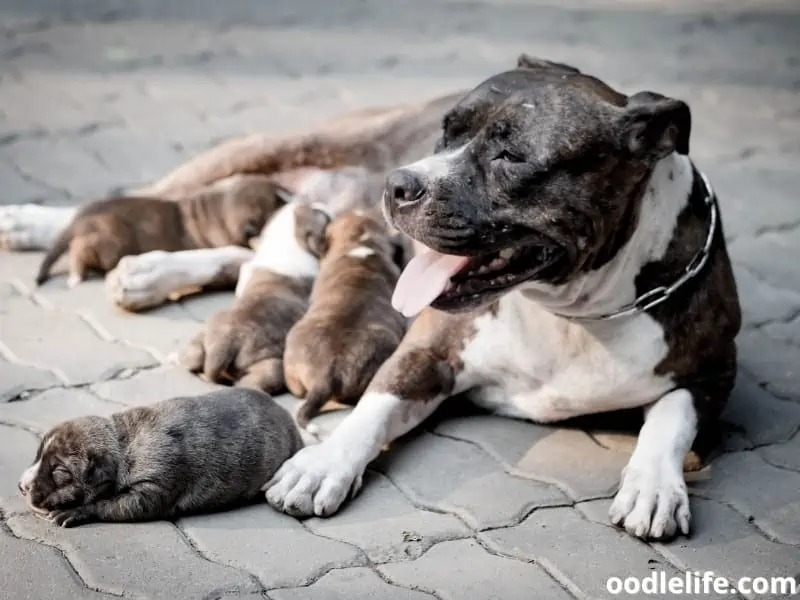
For example, imagine a helicopter parent hovering over their children. Uttering heartwarming lines such as “Don’t climb that tree, you’ll break your leg” or “Don’t touch that, it’s dirty.” While these words are filled with love and concern, they may limit their child’s growth and exploration.
Similarly, if we constantly handle a mother dog’s puppies, we might cause her to believe she’s not doing her job well, akin to pointing a paw at her and saying “Hey, are you doing this mother dog thing right?”
On the other hand, there’s a fine line when it comes to observing and handling newborn puppies. Occasional touching during health checks or if something seems amiss is necessary (we humans are notorious for meddling with nature for the greater good). In these situations, the mother dog would most likely appreciate your human prowess at ensuring the well-being of her puppies.
But the key here is to limit the frequency and duration of handling – as we all know, everything is good in moderation.
It’s important to be vigilant about the mother dog’s stress levels during interactions. If she exhibits signs of stress, such as panting, whining, or barking, take a step back and give her and her puppies some space. Remember, they’re still learning the ropes of this thing called life, and we wouldn’t want to intrude unmercifully.
In conclusion, try to maintain a balance between being hands-off and offering the necessary assistance. Keep your interactions brief, non-disturbing, and with a gentle touch. A happy, relaxed mother dog ensures the best start for her furry little ones, and isn’t that what we all want?
How to Properly Handle and Hold Puppies?
When it comes to handling newborn puppies, you must exercise great care and caution. Puppies are both delicate and vulnerable, so it’s crucial that you hold them correctly to avoid causing any harm or distress.
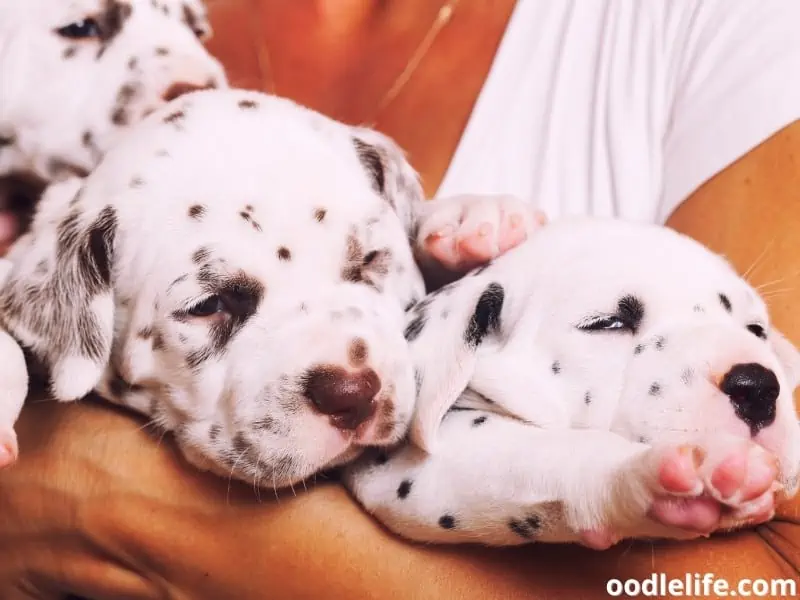
Firstly, wait until the puppies are at least 3 weeks old before handling them, unless it’s absolutely necessary. At this age, their tiny bodies are more developed and they can better withstand your gentle touch.
When the time comes to hold a puppy, make sure your hands are clean and sanitized. This helps prevent the spread of germs that could potentially harm the fragile newborns. Now, gently scoop the puppy up, providing ample support under its body.
Cradle the pup against your chest so it can snuggle into you for warmth and safety.
As you hold the puppy, be cautious not to squeeze or crush it, and avoid pinning its legs against the side of your body. Maintain a firm yet gentle grip at all times. Remember, these little ones are fragile, and even a short fall could be deadly.
Here are some additional tips for handling newborn puppies:
- Don’t pet the newborn like you would an adult dog. Their bodies are still too delicate for vigorous strokes.
- Keep your voice low and soothing when interacting with the puppies. This helps mimic the calming environment they’re used to with their mother and littermates.
- Limit handling sessions to short periods (around 5-10 minutes) to avoid causing stress or overstimulating the puppy.
Handling newborn puppies can be a joyful experience, as long as you are cautious and mindful of their delicate nature. Ensuring the safety and comfort of these tiny, lovable creatures will help them grow and thrive, ready for the adventures that await them in their new homes.
When Is It Safe to Hold Puppies More Frequently?
Becoming a puppy parent comes with lots of cuddles and snuggles, but when exactly is it safe to hold your newborn puppies more often? Let’s dive into this furry topic and watch out for those cute little paws!
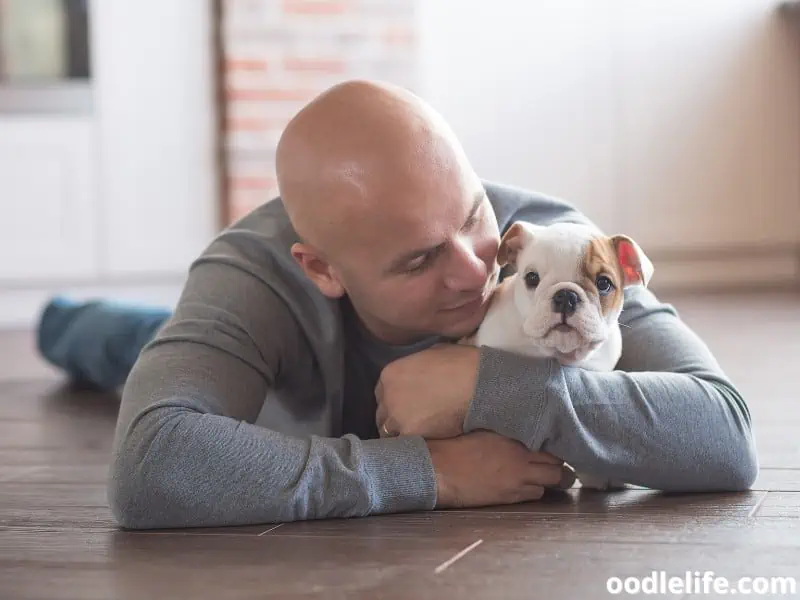
During the first two to three weeks of a puppy’s life, it’s best to limit the amount of handling. Newborn puppies are delicate and their eyes haven’t opened yet. But, don’t worry, patience is a virtue and their eyes will open soon enough, usually around three weeks.
At this point, it’s time to shift gears and pay more attention to those adorable little creatures!
With their eyes wide open, puppies are more prepared for your gentle touch. However, it’s important to remain cautious and watch for signs of discomfort. If a puppy squirms or shows distress, put them back with their mother and siblings.
Before you know it, your puppies will be fully engaged and eager to explore their surroundings. This is when you can start handling them more frequently while keeping a watchful eye on their interaction with the environment:
- Age 3-4 weeks: Hold the puppies briefly, maybe two times a day, allowing their little legs to find their footing on your lap.
- Age 4-6 weeks: You can start to pick them up a bit more often, but avoid any rough play. Puppies this age love a good belly rub, who doesn’t?
- Age 6-8 weeks: As they become more mobile, puppies may start to initiate play with you. This is a crucial stage for socialization and bonding, so enjoy the attention!
Remember, when holding and cuddling a puppy, always use a gentle and supportive grip. Show them that you’re trustworthy by being consistently kind and reassuring. Gradually, your love and affection will help transform your once-newborn puppies into well-adjusted, confident dogs.
And there you have it! We’ve taken you through the stages of when it’s safe to hold your puppies more frequently. Just keep a close watch, pay attention to their needs, and most importantly, savor those furry cuddles while they last – because they’ll grow up way too fast!
Special Care Instructions for Newborns
Whelping Box and Crate Setup
Newborn puppies need a safe, warm, and comfortable environment to support their development, which is why setting up a properly equipped whelping box and crate is essential. A whelping box should be spacious enough to accommodate the mother dog and her puppies, and it should have sides high enough to prevent puppies from escaping.
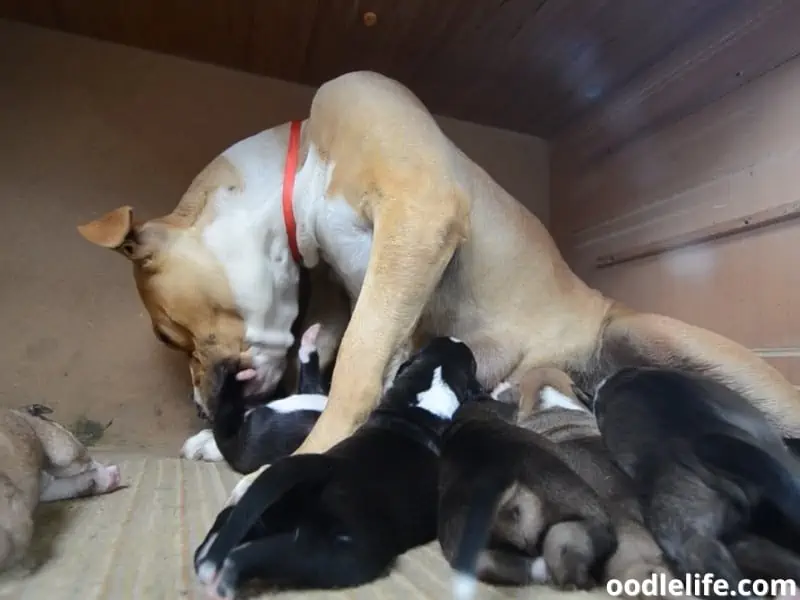
- Choose a crate suitable for the mother dog’s size
- Add a soft and washable bedding material, like blankets or towels
- Maintain a stable temperature between 96-98°F during the first week of life
- Consider adding a heat source, but avoid using heating pads, as puppies can suffer burns if the pad is too hot
It’s important to keep the whelping box clean and check on the puppies regularly. You can handle them gently, but minimize contact during the first week of life, to let them bond with their mother and avoid stressing her.
Preventing Mastitis in Mother Dog
Mastitis is an infection of the mammary glands that can develop in lactating dogs, causing discomfort and potentially harm to both the mother and her puppies.
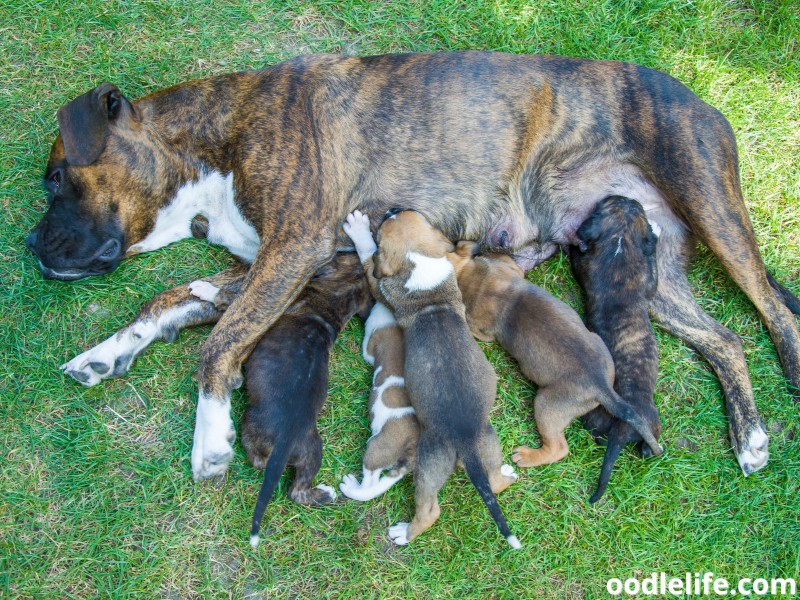
To prevent mastitis in mother dogs, consider the following suggestions:
- Ensure puppies are nursing evenly from all teats to avoid overburdening one area
- Keep the mother’s bedding and nursing area clean to minimize bacteria exposure
- Gently monitor her condition and consult a veterinarian if you see signs of mastitis, such as swelling, redness, heat, or pain in her mammary glands
Remember that newborn puppies fade fast when unhealthy, so if you notice anything unusual with either the puppies or their mom, seek veterinary help right away.
By setting up a comfy whelping box and keeping an eye on the mother dog’s health, you can provide the best possible start for your new furry friends. Just remember to handle the puppies with care and give them the space and time they need to grow strong and healthy, supported by their loving mom.
Raising a Puppy: A Long-Term Commitment
Raising a puppy is like having a new baby in the family; it requires patience, love, and dedication. In the beginning, newborn puppies need constant care and nurturing from their mother. Aspiring dog-parents should be aware that too much handling of these fragile creatures may be harmful.
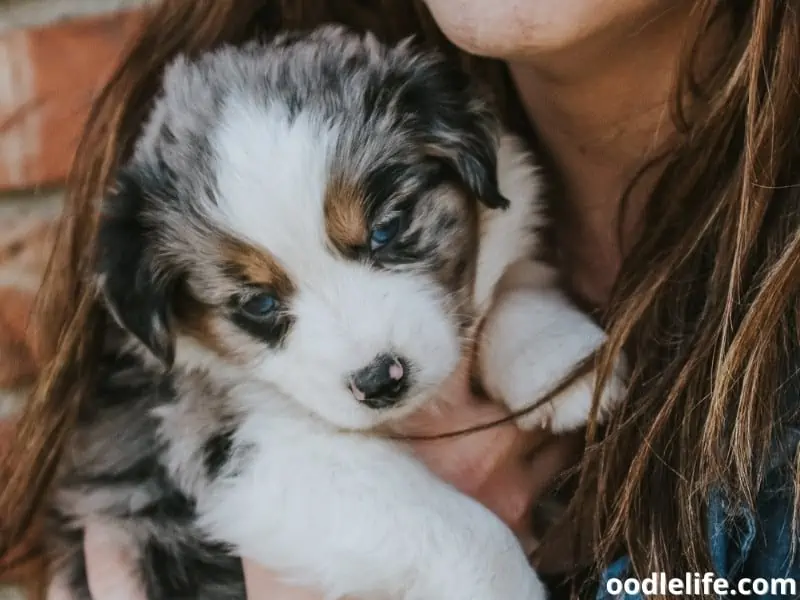
For example, newborn puppies cannot regulate their body temperature, so cuddling them for extended periods could unintentionally make them too cold or too warm. It’s essential to keep contact at a minimum and observe their mother’s reaction to your presence.
Once puppies reach around three weeks of age and their eyes open, handling becomes less risky. But remember, always be gentle! Puppies are tiny, adorable creatures and deserve the utmost care when being held or carried around.
As puppies grow, they’ll need proper training, food, exercise, and socialization. Think of it as that first wobbly bike ride without training wheels; your guidance is required at every step. Just like human children, puppies go through various stages of development, each requiring specific attention:
- Early socialization (3 weeks – 14/15 weeks): expose your pup to various experiences, environments, and other animals
- Adolescence (6 months – 2 years): be prepared for teenage-like behavior, such as testing boundaries and a sudden interest in “rebelling” against the rules
Between chewed-up sneakers, middle-of-the-night potty breaks, and puppy kisses, raising a puppy is a roller coaster of emotions and challenges. But with a lighthearted approach and a dash of humor, you and your furry companion will share countless memories, triumphant housetraining conquests, and snuggly afternoons on the couch. The long-term commitment pays off in droves, and that wagging tail becomes a beacon of joy and unconditional love in your home.